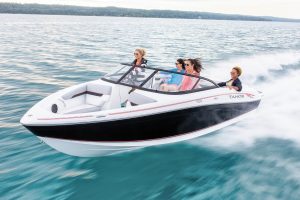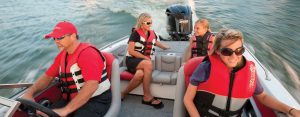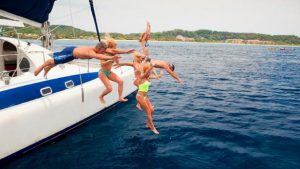Although it doesn’t seem like it, summer is right around the corner. Even better the beginning of boating season is just a couple of weeks away with Memorial Day Weekend. Memorial Day Weekend is a time for many in the area to get there boats into the water and start cruising around. But what many sometimes forget is that we need to treat your boat like the vehicle it is, so lets talk boat safety!
Be Weather Safe
First thing first is you should always check the weather before departing on to the seas. TV, Radio, or weather apps are your best bet. If you find that you come across bad weather that was not expected; dark clouds, strong winds, rough seas, the best thing you can do for yourself and the safety of your passengers is to turn around and head back to the dock.
Use common sense

The best thing you can do when your behind the wheel of your boat it to use your common sense. Think of being on the water is the same thing as being on the road. When you have your family in your car you obey all the rules of the road. Do the same for the open waters. Don’t speed and pay attention especially when in crowed areas. Also, be respectful of buoys and other navigational aids, all of which have been placed there to ensure your own safety.
Designate an Assistant Skipper
Before you head out on a big trip you should make sure you have another person with you that is familiar on boating. Always a good idea incase something happens to the captain, they get injured or incapacitated the assistant skipper can get the rest of the party home safely. They should be familiar with all aspects of your boat’s handling, operations, and general boating safety.
Designate a Float Plan
Weather its a family member or some in the marina, let them know your float plan. The should be how long your going to be gone for. DiscoveringBoating.com has come up with this list:
A float plan can include the following information:
- name, address, and phone number of trip leader
- name and phone number of all passengers
- boat type and registration information
- trip itinerary
- types of communication and signal equipment onboard, such as an Emergency Position Indicating Radio Beacon (EPIRB) or Personal Locator Beacon (PLB)
Proper Lifejackets

Did you know that most drowning on boats happen because people where not wearing life jackets? Make sure that everyone that comes on to your boat has the proper size life jacket. Children never take theres off while on the boat. If you are unsure about the size of life jackets, most marine supply stores can fit you for the proper size.
Avoid Alcohol
You are driving a boat, rules are just like in a car. Save the cocktails for while your are parked in the marina. Studies show that boating accidents double when alcohol is involved.
Learn to swim

If you’re going to be in and around the water, proper boating safety includes knowing how to swim. Local organizations, such as the American Red Cross and others, offer training for all ages and abilities. Check to see what classes are offered in your area.
Take a boating safety class
You may think that you know everything there is to being safe on the ocean. And the chances are you may know a lot, but you don’t know everything. These classes are usually offered by the coast guard, your boating club, and even your local marine store. They will cover everything you need you know about a safe boating.
